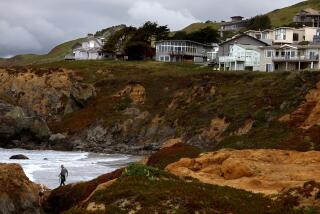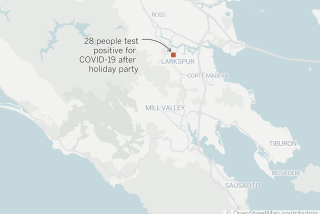Marin Study Links Alcohol, Cancer
- Share via
Alcohol consumption is the main risk factor for breast cancer among women in Marin County, home to one of the highest rates of the disease in the country, according to a study by UC researchers.
A team led by researchers from UC San Francisco found that women in Marin County with breast cancer were twice as likely as women without the disease to have at least two drinks a day. And the risk of cancer rose with the number of drinks consumed.
The study, published last week in the journal Breast Cancer Research, also found no difference in the length of residence between women with breast cancer and healthy women. That finding runs counter to contentions by some activists that the environment -- water, soil or air -- may put women in the county at greater risk for the disease, researchers said.
“It’s not the geography; it’s the demography,” said Tina Clarke, an epidemiologist at the Northern California Cancer Center.
Researchers surveyed 285 women who have had breast cancer and 286 women who have not. All are residents of the affluent Bay Area county, which has recorded 199 cases of breast cancer per year for every 100,000 white, non-Latino women. The national average is 144 cases.
Alcohol consumption, along with early puberty and late menopause, is among the factors that increase the risk of breast cancer, according to the National Cancer Institute. Rates of the disease are also higher among women who have never had children or who had their first child late in life, characteristics often found among affluent women.
Because the population studied in Marin County was so homogenous -- educated, white and affluent -- however, researchers were able to identify factors that distinguished cancer victims from healthy women. What stood out most clearly was alcohol consumption -- at least two drinks per day.
“Alcohol use, especially among a population with all the other risk factors, is an important factor that might make a difference in pushing someone into breast cancer or not,” said Margaret Wrensch, UC San Francisco professor of epidemiology, lead author of the study.
But Roni Peskin Mentzer, former president of Marin Breast Cancer Watch, a nonprofit group, said physical environment should not be ruled out as a factor in breast cancer among Marin women. The group co-authored the study with the UC San Francisco researchers.
The activist group is still investigating whether something in the county’s air, soil or water supply is contributing to the high incidence of breast cancer, said Mentzer, who was diagnosed with cancer in 1992 and is now free of the disease.
“We’re assuming that this is not a Marin-specific problem, but we must continue to look at the environment, because it has not been studied,” she said.






